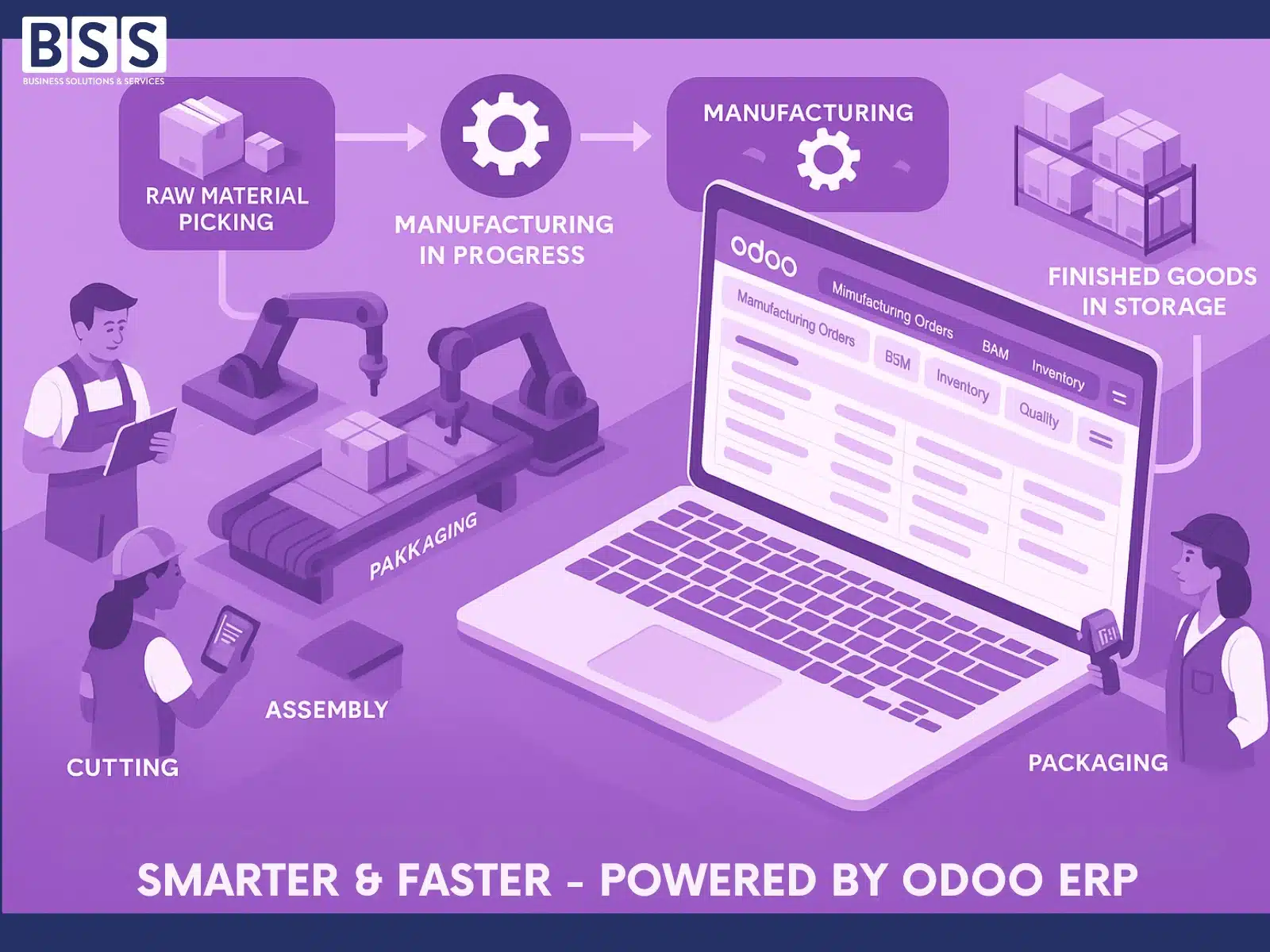Stockouts, production delays, and manual errors don’t just slow you down — they threaten your business growth, reputation, and customer satisfaction. In 2025, forward-thinking manufacturers are turning to Odoo ERP for Manufacturing — a powerful, open-source business suite built to solve real challenges with automation, real-time visibility, and complete workflow integration.
At BSS Universal, an official Odoo Partner, we go beyond surface-level setup. We offer fully tailored Odoo ERP implementation, customization, and support based on your unique production environment. This isn’t theory — it’s hands-on experience across industries like manufacturing, pharmaceuticals, food processing, electronics, and eCommerce.
What is Odoo ERP for Manufacturing?
Odoo ERP is an all-in-one, modular software suite that integrates everything manufacturers need: production planning (MRP), inventory, quality, purchasing, sales, CRM, HR, and accounting. Its Odoo ERP for Manufacturing module replaces spreadsheets, guesswork, and manual systems with automation, cost control, and 360-degree visibility.
From multi-level Bill of Materials (BoM) to work orders, barcode scanning, and lot/serial tracking, Odoo ensures complete traceability, smarter decision-making, and error-free execution.
Implementation Methodology at BSS Universal
We follow a proven, people-first Odoo implementation process:
1. Requirements Analysis & Gathering: We conduct detailed workshops to capture your current pain points and future goals.
2. Project Planning & Management: We define timelines, resources, and success KPIs. Agile or waterfall, the choice depends on your internal workflow.
3. Data Migration: We safely migrate product catalogs, open stock, transaction history, and vendor data.
4. Development & Customization: We configure and develop custom workflows, reports, dashboards, and alerts — tailored to your production needs.
5. UAT/Testing: User testing ensures everything works smoothly before Go-Live.
6. User Training: On-site or remote training sessions help your team adopt the system confidently.
7. Deployment/Go-Live: We deploy your solution with minimal downtime and live monitoring.
8. Post-Implementation Support: Continuous support, upgrades, and process optimizations are always available.
Step-by-Step: How Odoo Manufacturing Works
Step 1: Initial Setup & Configuration
Install the Manufacturing app. Enable work orders, BoM levels, quality, subcontracting, and maintenance. Accurate setup drives long-term efficiency.
Step 2: Master Data Creation
Create products (Inventory > Products > Create), mark “Can be Manufactured,” and configure BoMs. Add work centers with capacity and cost for better scheduling.
Step 3: Production Planning
Use Manufacturing Orders (MOs) to define production quantity and deadlines. Odoo’s MRP scheduler checks stock, triggers purchases, and starts production with smart automation.
Step 4: Inventory & Procurement
Odoo automatically checks material availability. Internal transfers or auto-created RFQs prevent stockouts. Everything connects to Odoo Inventory and Odoo Procurement workflows.
Step 5: Manufacturing Execution
Work orders guide operators using screens or tablets. Log time, scan barcodes, and track actual usage — creating real-time data visibility.
Step 6: Quality Checks
Add checkpoints for raw materials, in-process stages, and finished goods. Capture pass/fail, reasons, and scrap rates — all linked to serial or lot tracking.
Step 7: Finished Goods & Delivery
Completed goods are auto-transferred to inventory. Delivery orders trigger from Odoo Sales and logistics. Supports lot/serial number traceability.
Step 8: Reporting & Analysis
Visual dashboards highlight MO status, lead times, costing, OEE, and scrap. These insights power continuous improvement.
Top Odoo Manufacturing Features
- Multi-level BoMs & work orders
- MRP scheduler & automated procurement
- Barcode integration & mobile execution
- Quality checkpoints with serial/lot traceability
- Costing dashboards & production analytics
- Seamless integration with CRM, HR, Accounting, POS, and Sales
FAQs About Odoo Manufacturing
What is Odoo ERP software for manufacturing?
Odoo ERP is an open-source, modular software that integrates manufacturing, inventory, MRP, quality control, accounting, and procurement in one platform. It automates every step from production planning to delivery, offering full visibility, real-time tracking, and cost control—ideal for modern manufacturers seeking scalable ERP solutions.
Is Odoo good for small & medium manufacturers?
Yes, Odoo ERP is ideal for SMEs due to its modular pricing, cloud deployment, and open-source flexibility. It provides manufacturing features like MRP, barcode integration, and BOM costing—without the high cost of legacy ERP systems. SMEs gain automation, scalability, and real-time control for efficient operations and growth.
What is a Bill of Materials (BoM) in Odoo?
In Odoo ERP, a BoM (Bill of Materials) defines the raw materials, components, and operations needed to manufacture a product. It supports single and multi-level structures and connects directly to inventory, routing, and cost analysis. Accurate BoMs improve planning, reduce errors, and streamline production workflows.
Does Odoo support lot & serial tracking?
Yes. Odoo ERP offers complete lot and serial number tracking for raw materials and finished goods. This ensures traceability across procurement, production, quality, and delivery—essential for regulated industries like food, pharma, and electronics. It helps maintain compliance and product recall readiness.
Can I customize workflows in Odoo ERP?
Absolutely. With Odoo Studio, you can easily customize workflows using no-code tools. Add fields, automate approvals, create role-based dashboards, and integrate with third-party apps. This flexibility allows manufacturers to align ERP workflows with their real-world production needs, without costly development.
How long does it take to implement Odoo ERP?
Odoo ERP implementation typically takes 2–8 weeks, depending on complexity. At BSS Universal, we ensure smooth deployment through step-by-step phases: analysis, migration, customization, testing, training, and Go-Live. Our team provides complete support for a seamless ERP transition with zero disruption.
Does Odoo integrate with sales and accounting?
Yes. Odoo seamlessly integrates manufacturing with Sales, CRM, Accounting, and Inventory. Orders, invoices, and stock movements sync automatically, reducing manual entry and errors. This full integration streamlines operations and ensures accurate financial reporting and real-time performance tracking.
How does Odoo help with cost analysis?
Odoo ERP captures BOM cost, labor hours, machine usage, and overhead per Manufacturing Order (MO). It generates detailed cost reports to identify wastage, optimize pricing, and improve profit margins. Manufacturers can track actual vs. planned costs and make smarter budgeting decisions with real-time insights.
What if I’m switching from Excel to Odoo?
Switching from Excel to Odoo ERP is easy with BSS Universal. We handle clean data migration of products, vendors, stock levels, and transaction history. This transition eliminates manual processes and enables automation, improving accuracy, real-time tracking, and business scalability from day one.
Why should I choose BSS Universal for Odoo ERP?
BSS Universal is a certified Odoo Partner with deep experience in manufacturing ERP. We offer end-to-end services—requirement analysis, customization, data migration, training, and post-go-live support. Our goal is to deliver measurable ROI through tailored Odoo ERP solutions that scale with your business.
Why Odoo Over Other ERPs?
- Transparent Odoo pricing (Community vs. Enterprise)
- Mobile-ready Odoo app for shop floor use
- Flexible modules: Odoo CRM, Sales, HR, POS, Procurement
- Open-source customization with low TCO (Total Cost of Ownership)
- Active Odoo GitHub community + official Odoo documentation
Book a Free Odoo ERP Demo with BSS Universal
Don’t let outdated systems hold your factory back. Embrace automation, improve planning, and scale faster.
Contact BSS Universal today for a tailored demo, project roadmap, and expert support. Let’s make your Odoo ERP deployment a success story.
Book Your Demo → Contact Us

